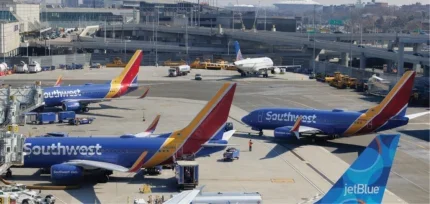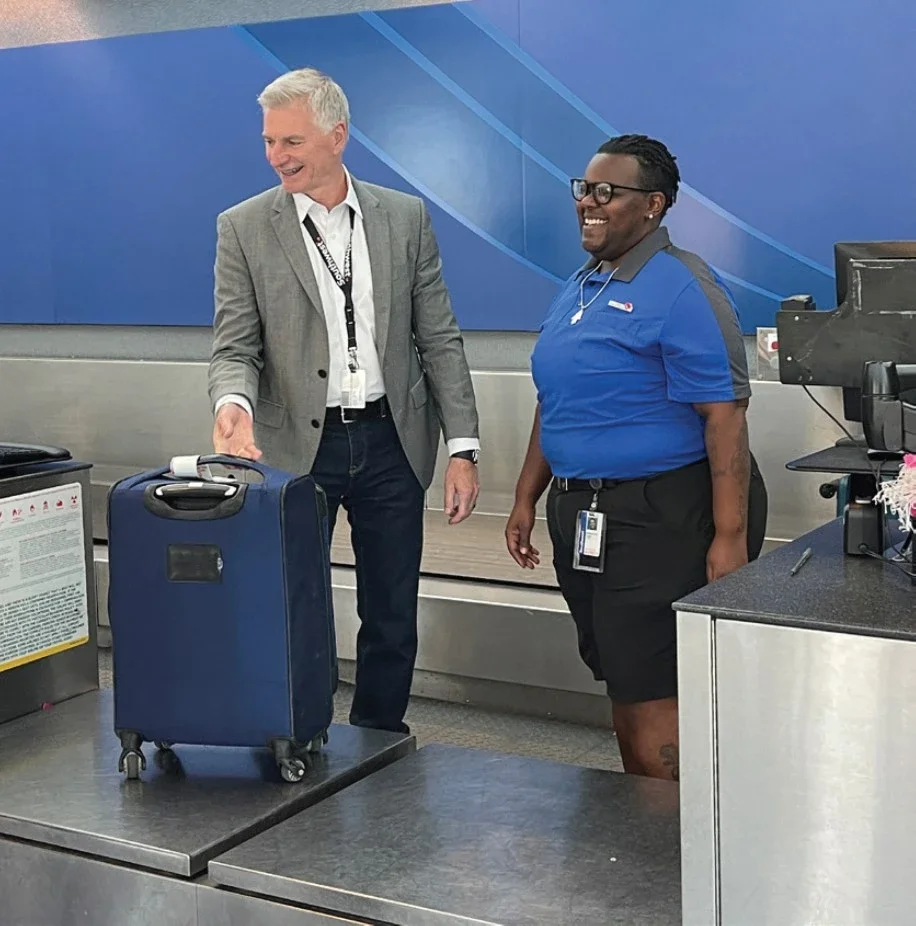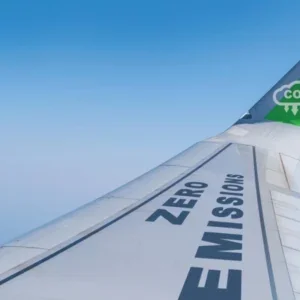
Halfway through our conversation, Robert Jordan brings me up short. We’re discussing how Southwest Airlines, the operator Jordan has led since February 2022, manages to top industry league tables so consistently – no mean feat in a sector infamous for big costs and small seats.
I suggest that perhaps these plaudits have something to do with how Southwest treats employees. At that, Jordan interjects. “Basically, you just used a Herb Kelleher quote,” he says, referring to the Southwest co-founder, who died in 2019. “Herb was famous for saying: ‘happy employees yield happy customers yield happy shareholders’. I don’t know if you knew that or not.”
As it happens, I wasn’t aware of Kelleher’s dictum. But my accidental reference is arguably the perfect way of understanding how Southwest Airlines operates. For if the airline regularly wins awards for flyer satisfaction – in 2022, Elliott Advocacy named it the US’s top domestic airline for customer service – that dovetails neatly with a reputation for treating staff with respect.
In the same year, Forbes proclaimed the Dallas airliner one of the best places to work in the US, the seventh year in a row it did so. And as Kelleher so vividly implied, and Jordan agrees, keeping passengers pleased would be impossible if check-in agents or flight crew weren’t themselves keen to help.
“It means they have a heart for service, they have a heart to serve our customers – but they also have a heart to serve each other,” is how Southwest’s current CEO puts it. “Most of the time, what I hear about… a terrific service experience comes down to this, it comes down to your people are just nicer, they’re happy, they’re funny, they’re friendly, they helped me out.”
Altogether, these principles have seen Southwest soar from a small regional airline into a major industry player, now boasting dozens of domestic destinations, even as it stretches out across the western hemisphere. That’s shadowed by other investments, from new aircraft to larger overhead bins. And if the old focus on smiling faces hasn’t gone away, it makes sense that such a vast operation must equally rely on robust technology – especially when without it, things can quickly go wrong.
The aviator
Beyond his role as company CEO, Jordan is in an excellent position to reflect on how Southwest has grown to become the US’s third-largest aviator. A veteran at the firm, he started his career there back in 1988 and has since worked everywhere from corporate strategy to fuel management. Boosting his schedule yet further since taking the top job, Jordan says he’s visited dozens of Southwest sites over the past 18 months, talking to colleagues and understanding their needs.
Characteristically for a company built on cordial relationships, meanwhile, he argues that courtesy calls help explain Southwest’s rise. “I think it helps us a ton internally,” is how Jordan puts it. “Because the leadership team – you know each other, you have relationships with each other. And there’s just very little politics here, so you can move through things and decisions and activities very quickly.”
Certainly, this claim feels fair when you consider Southwest’s impressive growth over recent times. In 2022 alone, the operator hired some 1,800 pilots, with plans to scoop up 2,300 last year. That’s shadowed by new destinations. Flying to 18 new cities during the pandemic, the company equally aims to bolster services beyond the US, flying to Belize, Puerto Rico and Los Cabos from this year.
“A terrific service experience comes down to your people are just nicer, they’re happy, they’re funny, they’re friendly.”
Once again, Jordan argues partnerships are key. Especially with airport slots in short supply – a couple of takeoff and landing spots at Heathrow were reportedly sold for $75m in 2016 – he suggests that “having a relationship at an airport” can be really helpful. How Southwest itself behaves matters too. “When we make a commitment to build a facility, acquire gates, use the gates,” Jordan says, “we live up to that.”
From there, all those new destinations need passengers to travel there – and staff to greet them. With that in mind, Jordan eagerly returns to his favourite Kelleher mantra. “Our folks do incredibly heroic things,” he says, describing how, upon hearing that a customer’s mother was in a faraway hospital, a Southwest representative offered to collect them at the airport.
It goes without saying, of course, that every multinational has stories like this. But beyond mere anecdotes, and as that flurry of industry awards implies, there are hints that Southwest really does offer more than the competition. This is true of price: Jordan and his team run the only large US carrier that is also low-cost. Nor does this imply the kind of draconian regulation Ryanair flyers have long tolerated across the pond.

On the contrary, perks like two free bags per passenger and credit that never expires, suggest that Southwest makes an effort to keep customers content. All the while, the kinds of heroics noted by Jordan can be understood by treating workers properly, with pension plans, generous PTO policies and stock purchase plans all standard fare.
Tech trials
He may have wandered up and down Southwest’s corporate corridors over the past four decades, but Jordan began his career in technology: and how long ago that now feels. When he began at the carrier, after all, the department had a mere 28 staff. Now, that number has risen to the thousands. Nor is that the only place where things have changed.
“When we make a commitment to build a facility, acquire gates, use the gates, we live up to that.”
When producing a flight schedule, for instance, Jordan and his colleagues were once obliged to chart routes on an enormous sheet of paper, spanning 18ft right across the room. It goes without saying, Jordan continues, that attempting the same trick today would be “literally impossible” – especially once you factor in Southwest’s greatly expanded roster of flights, as well as notes on weather, connections and everything else that a modern scheduler requires.
Once you add the way technology shapes other areas of the carrier’s operation – in fields as varied as organising crews and placating irate passengers – all those ones and zeros become even more prominent. As the executive puts it: “Everything you do, every process you run, relies on technology.”
Recent events have only made this even more obvious. In April 2023, for example, an hour-long outage on a vendor-supplied network firewall temporarily halted all Southwest departures. In December 2022, meanwhile, the company’s scheduling software wasn’t able to match crew and aircraft effectively enough, ultimately leading to the cancellation of around 15,000 flights.
To be fair, Jordan emphasises that these difficulties weren’t entirely down to dodgy tech. Regarding the December fiasco, for instance, he notes that the “historically extreme weather” made managing flights especially challenging. All the same, he concedes that “modernising the operation” is a major goal of his tenure as CEO, surely explaining the $1.1bn the airline spent on IT in 2022 alone.
“As we continue to add complexity and scale, [we’re] ensuring that we have the right investment to make sure that we are providing our people and our customers with the right tools, so that when they have changes and issues, we can scale and handle those.”
Flying high
Clearly, not every problem can be resolved by better hardware. Last year, Southwest was embroiled in a long-running dispute with pilots, primarily over flight scheduling. Together with a panoply of industry-wide challenges – from wages and staffing to the cost of fuel – you might wonder how Jordan copes with it all.
One clue may be the carefully arranged family portraits behind the desk he’s speaking to me from. “I’m a big believer that you have to have balance in your life,” Jordan explains, his southern lilt as distinct as ever. “The old work/life balance phrase is a tough one – because you work all the time. But you’ve got to make room for things that are important.”
To put it differently, if warm relationships are fundamental to the executive inside the office, they seem just as vital once he heads home. He says that spending time with his two kids, and two grandkids, is one of his “releases” from the pressures of running a $23bn company. The second is physical exercise.
“Indoor rock climbing is kind of my release right now,” he smiles. “It’s hard to find the time to do it – but I try to make time to do it at least once a week.” A busy schedule surely makes sense. For if the growth of recent time is impressive enough, Jordan has plenty more planned for the years ahead, soon hoping to build a stable of 1,000 aircraft, with 6,000 flights a day. All the while, he says, that old focus on relationships will remain as robust as ever. Considering everything Southwest has managed since Herb Kelleher first uttered his famous injunction, this policy seems wise.






